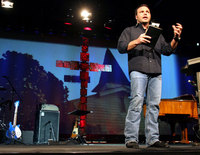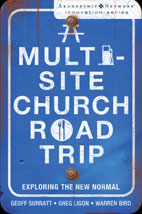Earlier this month Frank Viola confronted the growing trend of “post-church Christianity,” with a biblically-rooted argument that a gathering of two or three close friends is not “church” and therefore cannot be a substitute. We’re eager to continue the debate about what constitutes a legitimate church, and we found a worthy follow-up in the new book, A Multi-Site Road Trip by Geoff Surratt, Greg Ligon, and Warren Bird.
In a chapter titled, “Internet Campuses—Virtual or Real Reality?,” the authors profile the web congregation started by Troy Gramling of Flamingo Road Church in Cooper City, Florida. The follow excerpt is intended to answer the critics of internet churches. It also includes an extended rebuttal by Mark Driscoll who does not believe in the legitimacy of web-based church. (On a side note, Driscoll’s church issued a press release today announcing the release of a Mars Hill iPhone app which allows users to listen to sermons, watch sermon videos, receive church news updates, and even give donations toward the church’s mission.)

In a bricks-and-mortar church, leaders can limit distractions and use a variety of tools to create experiences to connect people emotionally to the music and message. With an online church, that is much harder to do. The people attending your church online might be doing a million different things in the background while the service is in progress. Or they might be in an environment filled with distractions. The growth edge for internet campuses is their need to move their attenders to full engagement. Perhaps the most challenging part of the internet campus idea is the reality that when people aren’t physically in the room, as they are in a church sanctuary, you can’t control the environment.
Some of you may still be skep¬tical (as I was before I experienced church online). The question asked most often is, “How do you know that disciples of Jesus Christ are actually being made?” When I asked Troy, he brought me back to his definition of church as a process of taking one step after another along the faith journey. As a church, Flamingo Road measures growth and discipleship through steps taken. Baptism is a discipleship step. Financial giving is a discipleship step. Serving is a discipleship step. Inviting friends to church and talking to them about Christ are also discipleship steps. Many of these discipleship steps are no different than the steps used to gauge growth at a church with a physical campus. In some cases they are even measured or tracked in the same way.

Troy sees the use of internet campuses as an outpouring of his pastoral heart. He views them as a tool to reach and disciple people all over the world. “Now it’s hard for me to say I don’t care about what happens in Oklahoma or Idaho or England or Peru,” he says, “when I have the technology in my hands that can help me reach people in those neighborhoods.”
Not everyone is quite as comfortable with the online approach to church. Mark Driscoll is the pastor of Mars Hill Church, which went multi-site in 1996 and currently has seven campuses in the Greater Seattle area. He objects to the idea of internet campuses, based on the definition of a local church found in Acts 2:42 – 47. Mark sees eight characteristics of a local church:
(1) regenerated church membership,
(2) qualified leadership,
(3) preaching and worship,
(4) rightly administered sacraments,
(5) unity through the Holy Spirit,
(6) holiness,
(7) the Great Commandment to love, and
(8) the Great Commission to evangelize and make disciples.
“I believe technology is in no way a substitute for life-on-life, face-to-face, actual Christian community where the eight characteristics of the church are present,” he says.
Even though he opposes the idea of the virtual church, Mark is certainly not opposed to the use of technology for ministry purposes. In 2007 Mars Hill Church was named the second most innovative church in America by Outreach magazine. In fact, Mark is very committed to the use of technology in ways that enhance and support actual, face-to-face community.

“At best, we might call an internet campus a ministry of a church, but to call it a church is without theological merit,” he concludes. He acknowledges that there are certainly some people who cannot participate in regular church gatherings for valid health reasons, such those who are hospitalized or the elderly. But he emphasizes as the norm Hebrews 10:24 – 25, which says, “Let us consider how we may spur one another on toward love and good deeds. Let us not give up meeting together, as some are in the habit of doing, but let us encourage one another.” Mark is concerned that the American consumer mentality will lead people who are otherwise able to attend in-person church services to justify exempting themselves from the full experience of what God intends church life and church discipline to be.
Mark has also gone on record against the practice of counting online audiences as part of a church’s regular attendance. He adds humorously, “That’s as disingenuous as me counting the roughly ten million downloads of my sermons via the internet every year as my church and declaring myself the pastor of the largest church in the history of the world!”
Taken from A Multi-Site Church Roadtrip by Geoff Surratt, Greg Ligon, and Warren Bird. Copyright © 2009 by Geoff Surratt, Greg Ligon, and Warren Bird. Used by permission of Zondervan.











